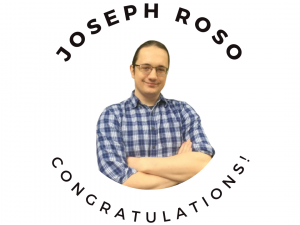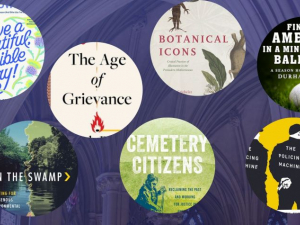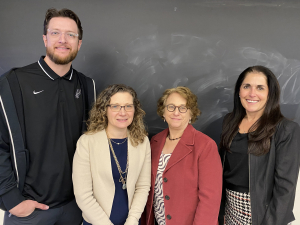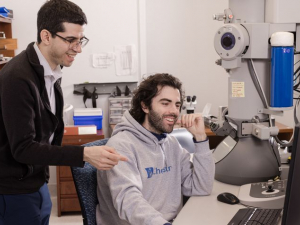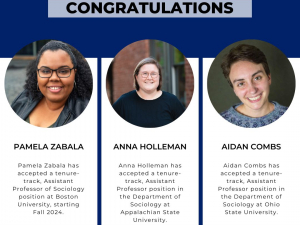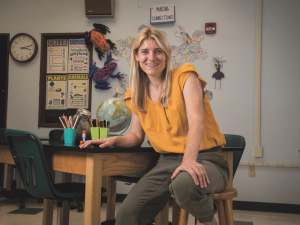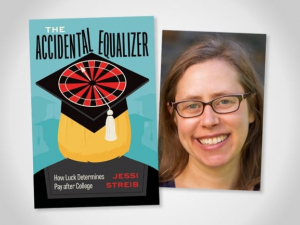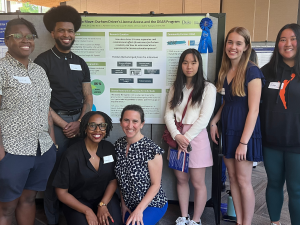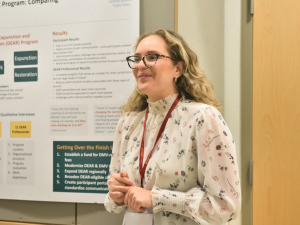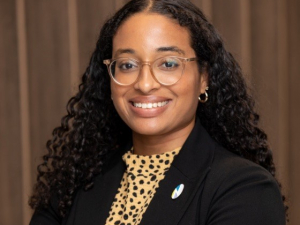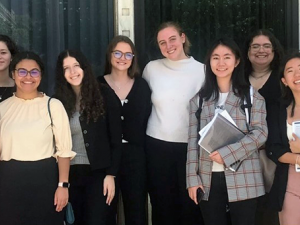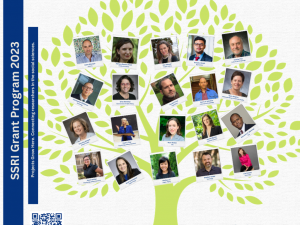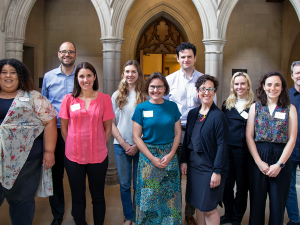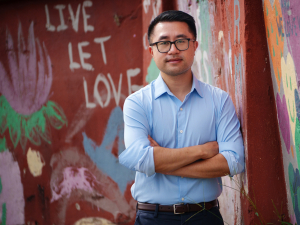Alpha Kappa Delta (AKD), the international sociology honor society, began in 1920 to “acknowledge and promote excellence in the scholarship in the study of sociology.” In 1967, AKD became a certified member of the Association of College Honor Societies. Over the past 100 years, universities have established almost 700 AKD chapters. We welcome and honor the newest inductees to Duke’s chapter. Christina Marie Aaron Chase Adkins Kelly Martina Araujo Kennedy Barron Reima Bash Isabella Birch Miriam Ruth Bussel-… read more about Duke Sociology Welcomes the 2024 AKD Inductees »
Joseph Roso has accepted an Assistant Professor of Sociology position at Ambrose University, in Calgary, Canada. Joseph received his PhD from Duke Sociology in spring 2023. During the 2023-24 academic year, Joseph held a Postdoctoral Research Associate position in the Department of Sociology and the Religion and Social Change Lab. Joseph’s research focuses broadly on religion, institutional change, and politics, and his published work has appeared in the sociology of… read more about Joseph Roso Accepts Assistant Professor Position »
Spring’s crop of books from Duke authors includes a history of grievance in the United States, an up-close look at the camaraderie at Durham Bulls games, and a guide on understanding sex and gender. Below is a roundup of some of the most recent and upcoming published titles. Many of the books, including new editions of previous titles, can be found on the “Duke Authors” display shelves near the circulation desk in Perkins Library. Some are available as e-books for quick download. Most can also be purchased through the… read more about Spring Books in Duke Authors: Meditations, Baseball, Rebels and Stomach Pains »
“Duke Sociology has been training excellence for a long time,” said Jen’nan Read, Sally Dalton Robinson Professor and chair of the Department of Sociology. Both the quality of Duke’s graduate Sociology program and the longevity of its success were evident on March 22, when three alumni returned to campus for a panel discussion with current and prospective graduate students. The event was sponsored by the Sociology department’s Jensen Speaker Series and by the Duke Centennial, in celebration of the 100th anniversary of the… read more about Sociology Alumni Share Their Experiences With Current Students »
DURHAM, N.C. -- Left unchecked, corrosion can rust out cars and pipes, take down buildings and bridges, and eat away at our monuments. Corrosion can also damage devices that could be key to a clean energy future. And now, Duke University researchers have captured extreme close-ups of that process in action. “By studying how and why renewable energy devices break down over time, we might be able to extend their lifetime,” said chemistry professor and senior author Ivan Moreno-Hernandez. In his lab at Duke sits a… read more about Nanoscale Movies Shed Light on One Barrier to a Clean Energy Future »
Pamela Zabala has accepted a tenure-track position as an Assistant Professor of Sociology at Boston University, starting Fall 2024. She received TWO job offers, including her top choice at BU. Pamela is currently a PhD candidate. She is a sociologist of race and ethnicity with a focus on race and racism in transnational contexts. She has a recently published peer-review article in Ethnic and Racial Studies titled "The social aftershocks of a migration crisis: racial… read more about Zabala, Holleman, Combs Accept Tenure-Track, Assistant Professor Positions »
Want to have more productive conversations on social media? Maybe a chatbot can help. New research from Duke sociologist Christopher Bail and a team of Brigham Young University colleagues used artificial intelligence to intervene and improve conversations online. The team built an AI chat assistant to mediate conversations between two people on opposite sides of the ongoing gun control debate. When one participant was about to send a message, the chat assistant – or ‘chatbot’ – would rephrase the language, with evidence-… read more about Bridging Political Divides With Artificial Intelligence »
Jen’nan Read lead of panel of experts who study how racial and ethnic categories are defined in US, how those definitions change over time, and the implications of the definitions for social inequality. The US Census Bureau organized the session to receive feedback on the possibility of dropping the ancestry question on future data collection instruments, including the decennial Census and American Community Survey. Read and colleagues argued that ancestry is distinct from racial identity and demonstrated how dropping it… read more about Federal Standards on Race/Ethnicity »
During her last undergraduate semester at Duke, Aasha Henderson worked with colleagues in Sociology and Nursing to examine health outcomes in a Latinx community. Her independent study paper compared how recent Latinx immigrants to North Carolina categorized themselves into racial groups (self-reported race) to how they believed other Americans would perceive their race when they walked down a street (street race). When given the U.S. Census categories, most research participants self-reported… read more about Aasha Henderson, Duke Sociology Undergraduate, Publishes Paper on Race & Health »
V. Joseph Hotz, Arts & Sciences Distinguished Professor of Economics, Tyson Brown, WLF Associate Professor of Sociology and Naomi N. Duke, Associate Professor of Pediatrics and Sociology are part of a team of researchers that have received a five-year, $25.3 million National Institute on Aging (NIA) award. The award will address gaps in the understanding of potential risks for Alzheimer’s Disease and Alzheimer’s Disease-Related Dementias (AD/ADRD). Hotz, Duke and Kathleen Mullan Harris and Krista M. Perreira at the… read more about Duke and UNC Multidisciplinary Team Awarded $25.3 Million to Study Alzheimer’s Disease »
Tony Cheng, assistant professor of Sociology. (John West/Trinity Communications) “How do police departments resist institutional reforms?” That is a question Tony Cheng, assistant professor of Sociology, poses in his forthcoming first book, “The Policing Machine: Enforcement, Endorsements, and the Illusion of Public Input.” The book is based on nearly two years of ethnographic data Cheng collected in New York City, attending community meetings, church events and local protests to… read more about Tony Cheng Reveals How Police Departments Assert Their Legitimacy and Independence Through the Illusion of Public Input »


